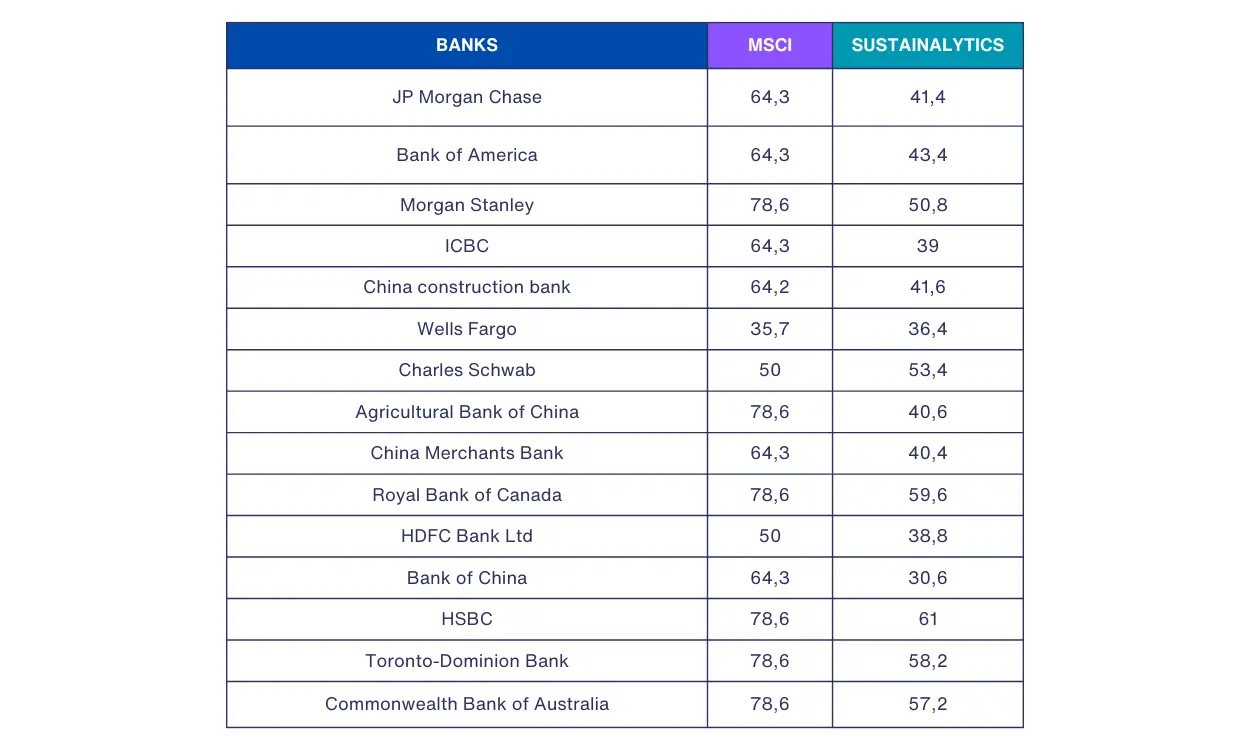 George Markezinis
George Markezinis

Assessing a company’s ESG performance poses considerable challenges, primarily due to the need for precise and uniform data, a hindrance widely recognized by global investors as a significant barrier to ESG investment. ESG ratings rely on non-financial variables, which are inherently intricate to quantify. Additionally, various scoring systems and sustainability reporting frameworks are at the disposal of organizations for evaluating their social and environmental contributions. Consequently, ESG data exhibits disparities and proves demanding to juxtapose across different companies.
Demand for ESG information and ESG ratings has exploded in recent years, and there has been an unprecedented surge in orders for increased transparency regarding environmental, social, and governance factors. ESG issues increasingly capture the attention of stakeholders of various profiles, like investors, asset owners, companies, regulators, and other stakeholders. That’s why companies are under massive pressure to become more sustainable, avoid obsolescence, manage risks, drive innovation, and build brand loyalty.
ESG reporting is an all-around disclosure of a company’s environmental, social, and governance initiatives, performance, and effects. It gives stakeholders the opportunity to make knowledgeable decisions about the company’s commitment to sustainable practices, and it helps organisations understand their impact on the world and the impact of the world in the organisation. There are many companies that use ESG ratings from rating agencies to make smarter investment decisions.
There are a lot of ESG rating agencies in various parts of the world that conduct reports on the ESG performance of businesses. The sustainability scores that are generated from these reports are known as ESG ratings. They are percentages or letter grades given to companies aiming to measure their reporting transparency, performance, and exposure to critical environmental, social, and governance topics.
A favourable score means a company manages its sustainability risks while taking advantage of possible opportunities. A less good rating, nevertheless, usually implies that the business needs to display better reporting transparency or handle its exposure to ESG risk factors. A company’s rating allows investors to determine whether its values align with their personal goals, and they use it to decide whether to invest in the business.
The factors that affect the ESG scores are Environmental, Social, and Governance-related, and they could be the following:
Environmental: GHG emissions, Carbon emissions, Use of renewable energy, Energy efficiency, Green and smart buildings, Resource acquisition, Waste reduction, Water management, Biodiversity conservation, Sustainability of transportation.
Social: Relations and engagement with the community, Diversity and Inclusion in the workplace, Employee Health and safety standards, Labor practices, and Human rights practices.
Governance: Diversity, Structure and Independence of the Board, Pay range, Executive compensation, Transparency, Ethical practices, Stakeholder engagement, Conflict of interest policies.
There are three types of ESG rating agencies as also mentioned on an article by Delloite:
ESG rankings entail the assessment of companies’ ESG performance and placing them in a structured hierarchy according to their relative ESG scores or ratings. This process results in a concise overview of benchmarked companies’ ESG practices. The primary purpose of these rankings is to directly compare companies’ performance in relation to each other rather than furnishing exhaustive details of ESG scores or grades. Such rankings serve the practical function of expeditiously pinpointing industry or sector leaders and those entities falling behind in ESG standards.
There are a lot of benefits that come along with high ESG ratings, which are the following according to ESG|The Report:
ESG rating agencies exhibit substantial variations in their rating systems, resulting in divergent assessments of the same companies. The presentation formats of these ratings range from numeric scores to percentages and letter grades. Although specific shared criteria are present, a universally standardized framework remains absent. The differences in their stated goals, however, show that they use a variety of techniques. ESG rating agencies seek to offer insights into the quality of environmental, social, and governance practices.
MSCI ESG Research
MSCI ESG Ratings strive to evaluate a company’s handling of financially significant ESG risks and opportunities. Their method is based on rules that show which companies are leading and trailblazing in their field based on how exposed they are to ESG risks and how well they can handle these risks compared to their peers. Their ESG Ratings (Rating scale: AAA to CCC) encompass a spectrum from leaders (AAA, AA) to average performers (A, BBB, BB) and down to laggards (B, CCC). Additionally, they extend their rating services to equity and fixed-income securities, loans, mutual funds, ETFs, and countries.
Sustainalytics’ ESG Risk Ratings
This rating system provides a well-defined understanding of ESG risk at the company level, gauging the extent of ESG risk that still needs to be addressed. It achieves this through a distinct set of MEIs, focusing solely on issues that could significantly affect a company’s economic value. The rating assesses ESG performance across over 14,000 companies, categorising them on a scale from minimal to high-risk (Rating scale: out of 100). It comprises three key components: corporate governance, MEIs, and idiosyncratic (unpredictable events) issues. The firm scores businesses using these five risk levels: Negligible (0-10), Low (10-20), Medium (20-30), High (30-40), Severe (40+).
Bloomberg ESG Data Services
Bloomberg has been an institution in the financial sector for over four decades. At Bloomberg, they target the meticulous standardization of ESG data, ensuring comprehensive coverage of at least 80% of a company’s operational and workforce aspects. There are in-depth explanations of the sources and methodologies used in the data and models. Bloomberg’s ESG datasets encompass nearly 93% of the total global equity market capitalization. This coverage aims to provide dependable ESG score data and metrics to promote clarity on sustainability matters. Bloomberg’s commitment extends to scrutinizing and normalizing data across various sustainability areas, including climate change, energy management, health and safety, materials and waste, board independence, shareholders’ rights, and other topics (rating scale: out of 100).
ISS’ ESG Ratings
ISS engages in data analysis and delivers evaluations on various ESG (environmental, social, and governance) investment considerations. In its ESG rating approach, ISS employs a standardized scorecard that proves advantageous for evaluating both industry-wide and company-specific aspects. ISS also provides climate-related data, analytical insights, and advisory services to help people in the financial market understand, measure, and deal with climate-related risks in all kinds of assets.
FTSE Russell’s ESG Ratings
By utilizing publicly available information, FTSE conducts sustainability assessments for a broad portfolio of over 7,200 securities. Based on their ESG ratings and data model, which includes Pillar and Theme Exposure as well as a large group of about 300 indicators, these evaluations come up with a full overall rating (with 5 being the best).
Refinitiv
Refinitiv ESG Scores have been formulated to offer a transparent and impartial assessment of a company’s ESG (Environmental, Social, and Governance) performance, dedication, and efficacy. These scores include evaluations of the three main areas as well as 10 specific themes, such as human rights, emissions, new environmental products, and shareholder issues (score range: 0–100). These assessments are founded on publicly disclosed data. Furthermore, the scores furnish a comprehensive rating that takes into account the influence of noteworthy ESG controversies reported in the global media, which have a substantial impact on corporations.
It is noteworthy to examine how some of the world’s greatest banks, in terms of market capitalization, display a diverse spectrum of ESG scores. Ratings are received by MSCI (with MSCI scores being presented in septiles and then converted into seven percentile bands, each spanning 14.29 percentage points, and the median percentile within each band being designated as the score out of 100) and Sustainalytics.

Source: Statista
It is increasingly noticeable how mainstream investing is centered around ESG factors. That means that the more a company focuses on its ESG performance, the better the chances are that investors will approach them and take it into consideration when they are making investment decisions. Let’s explore in what ways companies can raise their ESG score.
Finding these factors that impact ESG performance to improve ratings is critical. Some of the most common examples are greenhouse gas emissions, workplace diversity and conditions, and social cause donations.
Is ESG well integrated into the business plan? Companies need to ensure that their sustainability policies are disclosed and communicated to all their stakeholders so they can lead ESG. Additionally, choosing the right ESG reporting standards and frameworks can significantly boost a company’s ESG performance, thereby affecting its ESG ratings such as MSCI, Sustainalytics, CDP, and CSA in a positive way.
Moreover, what should not be bypassed is the significance of sustainability within the company’s philosophy. Sustainability needs to be at the heart of corporate cultures. Stakeholders can then become inspired when they are fully aware of ESG issues and better handle them.
While the green sector broadens globally, professionals are looking to acquire or enhance their skills, as it is recognized how increasingly integrated sustainability has become for companies. EcoSkills is on a mission to offer global workforces the opportunity not only to learn about the latest trends in ESG and sustainable finance but also to understand how to create and upgrade an ESG strategy via its certified course on ESG Performance for Companies and Investors.
We invite you to explore the units and find out what skills you will gain through this transformative learning journey.
